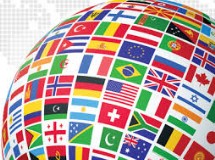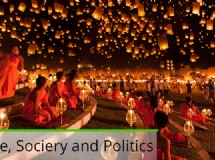Halloween is fast approaching, and little monsters everywhere are scrambling for costumes. Every year there should be an awareness campaign about the practice of Americans assuming Indian identity by donning an "Indian costume."
What do "they" get out of playing Indian? Maybe it fills some psychological-spiritual void that is created by the separation of man and nature, the latter to be exploited (toiled) as in the Bible or in accordance with the scientific method—but to say that would be stereotyping on my part. It is clear to me that several generations of media have succeeded in making caricatures of Indigenous peoples. Intentionally or not, the American Indian, by and large, has been made out to be something other than a normal contributing component of western civilization. The reasons for this phenomenon are not hard to imagine when one considers the inter-generational conditioning Americans are put through via school and pop culture.
Because most Americans see American Indians as a conquered and disappearing race, they see no wrong in playing Indian dress-up, particularly in social situations which do not include Indians. When in fact there is definitely a wrongful appropriation happening. Members of the mainstream—historically of Euro descent—have crafted 500 years of institutional paradigms that usually depict the Indian as noble, savage, bloodthirsty, lusty, and/or fierce. More importantly, the mainstream is convinced that Indians, having not figured out how to exploit the earth properly, were and continue to be impediments to "progress"—progress as defined in "modern" financial-industrial civilization. These collective paradigms see us as relics, as interesting little bits of history, ones that fit well into the narratives of White heroes.
Consider these questions: Can I touch your hair? Are you a real Indian? Do you live in a tipi? I have personally been asked these questions in real life. Can I put your living culture in museum? Can I withhold sacred items for scientific inspection? Can you be our specimen? Can we track you based on pedigree as we do our dogs and horses? Can we enforce our imaginary Christian dominion over you without you even questioning its legitimacy? These questions are sometimes not even asked; they go without saying and many Indians greet them without so much as raising an eyebrow.
Thus, I can understand why the average American would not consider whether his or her action in dressing up as an Indian for Halloween is offensive. I have said before that no longer are we living our identity; we are looking at it through a lens created by the European—a lens in which Indians are inferior and whites are superior. We are looking through a lens created and shown by such ongoing practices as Indian Halloween costumes, countless Hollywood "Indian" cameos or Indian oriented material, phony commercialized "Indian" products, and the use of Indians as team nicknames and mascots. Whatever the market demands, the market will produce. Right now, we are seeing what the market demands.
Inevitably, we judge our own "Indianness" based on the whole of our life experiences and learning. Largely, the whole of our learning consists of foreign perceptions learned in schools, internet, TV and other outlets. My fellow Indians and forward thinking Americans, we are in for serious challenges with respect to changing the way the market and the media treats Indians. However, with ever-changing media, including the internet and television, I am genuinely hopeful because American Indians are beginning to tell their own stories. It remains to be seen the level at which we break into the "mainstream"—or if we do, whether we can change stubborn minds.
We are beginning to own our image and remake it in a manner that suits us, the real Indians. I say that we are facing a lifetime challenge because we have so much re-learning to do. Ours is a society that denies its own holocaust. Few are the people that actually want to come face to face with the real America. But we have to; and we must forgive. I have meaningful conversations with my eight year-old daughter every time she tries to attribute all of white-America's historical wrongdoings to her young white contemporaries.
So, let me close by saying that I know the market will demand Indian costumes into the foreseeable future. However, if you choose to dress up in an "Indian costume" during Halloween or some other function, you had better hope you only run into the more civilized lot of Indians. Because you don't want to encounter Indians of a different persuasion. I know violence is not the answer here, I will only say that I have personally witnessed these less civil Indians (professional colleagues who will go unnamed) on a Halloween night; they do not take kindly to your ill-advised costume choice and will let you know it. For my children's sake, I am glad they do not tolerate such behavior. Sometimes, change is hard to come.
What do "they" get out of playing Indian? Maybe it fills some psychological-spiritual void that is created by the separation of man and nature, the latter to be exploited (toiled) as in the Bible or in accordance with the scientific method—but to say that would be stereotyping on my part. It is clear to me that several generations of media have succeeded in making caricatures of Indigenous peoples. Intentionally or not, the American Indian, by and large, has been made out to be something other than a normal contributing component of western civilization. The reasons for this phenomenon are not hard to imagine when one considers the inter-generational conditioning Americans are put through via school and pop culture.
Because most Americans see American Indians as a conquered and disappearing race, they see no wrong in playing Indian dress-up, particularly in social situations which do not include Indians. When in fact there is definitely a wrongful appropriation happening. Members of the mainstream—historically of Euro descent—have crafted 500 years of institutional paradigms that usually depict the Indian as noble, savage, bloodthirsty, lusty, and/or fierce. More importantly, the mainstream is convinced that Indians, having not figured out how to exploit the earth properly, were and continue to be impediments to "progress"—progress as defined in "modern" financial-industrial civilization. These collective paradigms see us as relics, as interesting little bits of history, ones that fit well into the narratives of White heroes.
Consider these questions: Can I touch your hair? Are you a real Indian? Do you live in a tipi? I have personally been asked these questions in real life. Can I put your living culture in museum? Can I withhold sacred items for scientific inspection? Can you be our specimen? Can we track you based on pedigree as we do our dogs and horses? Can we enforce our imaginary Christian dominion over you without you even questioning its legitimacy? These questions are sometimes not even asked; they go without saying and many Indians greet them without so much as raising an eyebrow.
Thus, I can understand why the average American would not consider whether his or her action in dressing up as an Indian for Halloween is offensive. I have said before that no longer are we living our identity; we are looking at it through a lens created by the European—a lens in which Indians are inferior and whites are superior. We are looking through a lens created and shown by such ongoing practices as Indian Halloween costumes, countless Hollywood "Indian" cameos or Indian oriented material, phony commercialized "Indian" products, and the use of Indians as team nicknames and mascots. Whatever the market demands, the market will produce. Right now, we are seeing what the market demands.
Inevitably, we judge our own "Indianness" based on the whole of our life experiences and learning. Largely, the whole of our learning consists of foreign perceptions learned in schools, internet, TV and other outlets. My fellow Indians and forward thinking Americans, we are in for serious challenges with respect to changing the way the market and the media treats Indians. However, with ever-changing media, including the internet and television, I am genuinely hopeful because American Indians are beginning to tell their own stories. It remains to be seen the level at which we break into the "mainstream"—or if we do, whether we can change stubborn minds.
We are beginning to own our image and remake it in a manner that suits us, the real Indians. I say that we are facing a lifetime challenge because we have so much re-learning to do. Ours is a society that denies its own holocaust. Few are the people that actually want to come face to face with the real America. But we have to; and we must forgive. I have meaningful conversations with my eight year-old daughter every time she tries to attribute all of white-America's historical wrongdoings to her young white contemporaries.
So, let me close by saying that I know the market will demand Indian costumes into the foreseeable future. However, if you choose to dress up in an "Indian costume" during Halloween or some other function, you had better hope you only run into the more civilized lot of Indians. Because you don't want to encounter Indians of a different persuasion. I know violence is not the answer here, I will only say that I have personally witnessed these less civil Indians (professional colleagues who will go unnamed) on a Halloween night; they do not take kindly to your ill-advised costume choice and will let you know it. For my children's sake, I am glad they do not tolerate such behavior. Sometimes, change is hard to come.
SHARE





































